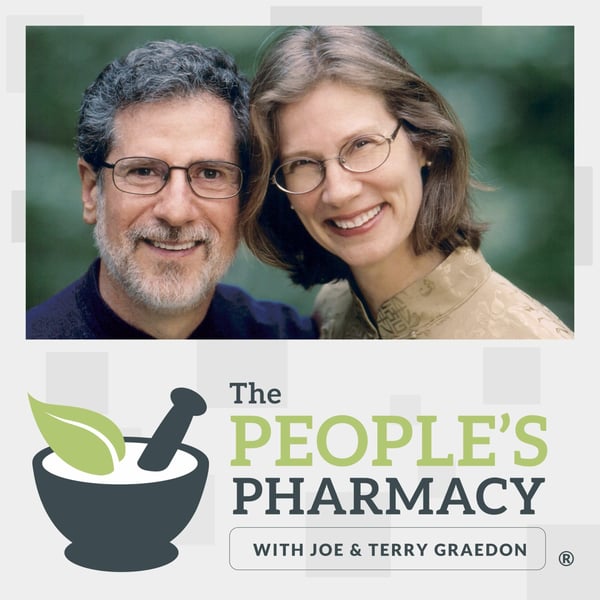Show 1315: Are We Medicating Normal Emotions? (Archive)
The People's Pharmacy
Joe and Terry Graedon
4.5 • 934 Ratings
🗓️ 9 May 2024
⏱️ 61 minutes
🧾️ Download transcript
Summary
Transcript
Click on a timestamp to play from that location
| 0:00.0 | I'm Joe Gradyton and I'm Terry Grady. Welcome to this podcast of the People's Pharmacy. |
| 0:06.1 | You can find previous podcasts and more information on a range of health topics at |
| 0:11.5 | People's Pharm pharmacy.com. |
| 0:15.0 | Everyone experiences loss and grief, |
| 0:18.0 | and most of us feel anxious or worried from time to time. |
| 0:21.0 | Do we need medications? This is the People's Pharmacy with |
| 0:25.8 | Terry and Joe Grayden. Doctors have a lot of medications to choose from when it comes to treating anxiety or |
| 0:38.9 | depression, but are these always the best options? What other tools do they have to help people cope with the challenges of everyday life? |
| 0:47.6 | Our guest today describes some of the difficulties people can experience when trying to stop anti-anxiety agents. |
| 0:55.3 | Are patients adequately warned about discontinuation syndrome before they start? |
| 1:00.9 | Do doctors explain medication side effects clearly? |
| 1:04.0 | Coming up on the people's pharmacy, Health Headlines, cognitive decline is not inevitable with |
| 1:20.2 | aging. That's the conclusion from a study of Spanish octogenarians published in the Journal of |
| 1:26.0 | Neuroscience. The investigators studied a group of 64 so-called super-ageers and compared them to 55 typical older adults. They gathered |
| 1:36.5 | both cross-sectional and longitudinal data on brain structures and cognitive ability. |
| 1:42.0 | In addition to tests to assess verbal skills and memory, |
| 1:45.6 | the volunteers went in for blood analysis and brain imaging yearly for five years. |
| 1:51.5 | Neither group had signs of Alzheimer's disease. The Super-Agers, however, showed |
| 1:56.6 | evidence of stronger connections between areas at the front of the brain. They also had more |
| 2:02.2 | white matter in the hippocampus |
| 2:04.0 | area, part of the brain that's crucial for memory. The researchers looked for |
| 2:09.0 | differences between the two groups. Super-Agers had better blood pressure and blood sugar control and also better |
... |
Please login to see the full transcript.
Disclaimer: The podcast and artwork embedded on this page are from Joe and Terry Graedon, and are the property of its owner and not affiliated with or endorsed by Tapesearch.
Generated transcripts are the property of Joe and Terry Graedon and are distributed freely under the Fair Use doctrine. Transcripts generated by Tapesearch are not guaranteed to be accurate.
Copyright © Tapesearch 2025.

